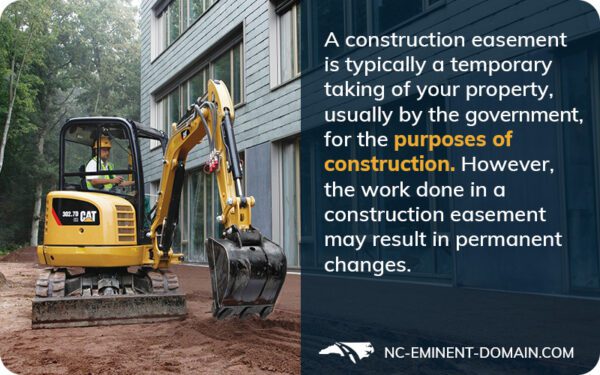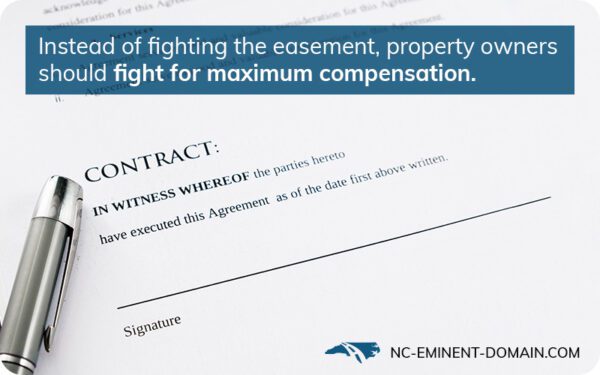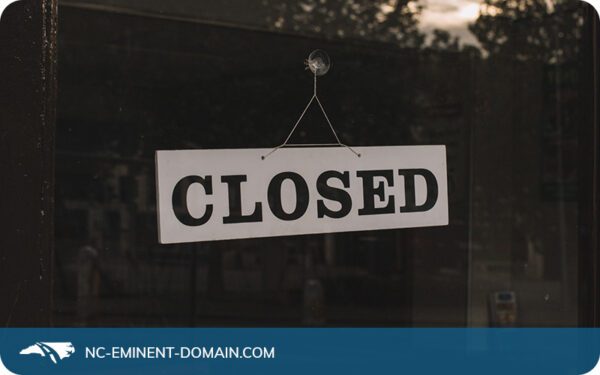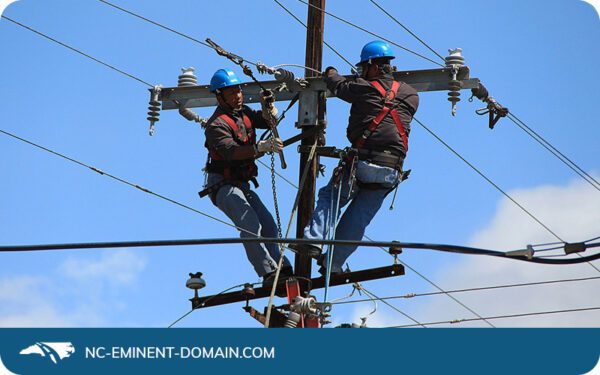For some property owners, a construction easement might seem like no big deal, especially if it’s a “temporary construction easement.” Sometimes, the government or a utility needs access or a bit of space for a little while, right? It probably won’t last long and won’t be a big hassle.
The truth is that even a temporary construction easement may permanently and adversely affect your property.
Has the DOT contacted you about a construction easement on your land? Get a free case evaluation from an experienced eminent domain firm before you agree to anything!
What is a construction easement?
A construction easement is a taking of your property by a condemning authority, usually the government, for the purposes of construction work on a project. These easements typically grant access to or across your land, a place to store materials and equipment related to construction, permission to remove of trees or vegetation, and other destructive and potentially permanent changes to your property.

Like any easement, a construction easement runs with the land. That is, even if you sell your land, the new property owner will still have to honor the easement, even if it is a temporary construction easement, until the need for that construction easement is finished. That can affect the sale value of your property.
What is a “temporary” construction easement?
A temporary construction easement allows the condemning agency (the government or an authorized utility company) to take a part of your property for a limited time to complete a construction project. While the implication is that a temporary construction easement is somehow limited in its scope, even a temporary easement agreement can have permanent impacts on your property.
There are multiple possible downsides to a temporary construction easement:
- First, the government does not have to give you an exact timeline for the project when they take the easement. Even if they give you one, delays can extend the timeline by years.
- Second, “temporary” easements are often defined in extremely broad terms and can include anything from storing equipment and vehicles to adding and removing soil. Construction easements grant the easement holder very broad rights over your property.
- Third, a temporary construction easement agreement may give the government or utility additional rights to alter the land when they use it. For example, slope easements are sometimes hidden within the language of a temporary construction easement. A slope easement gives authorities the right to alter the elevation of your property in the easement area, and they are not obligated to return the land to its original form.
In many ways, a temporary construction easement is often anything but temporary.
What is a permanent construction easement?
There’s technically no such thing as a permanent construction easement, which is logical – how can something be permanently under construction? If they’re building a road, it’ll have to be finished at some point.
The term is sometimes (and inaccurately) used synonymously with utility easement because utility easement agreements are usually permanent and can contain implied easements which function like temporary construction easements.
North Carolina law doesn’t specifically classify construction easements as permanent or temporary, so consult an experienced eminent domain attorney, no matter what type of construction easement you think you’re facing, prior to signing the agreement.
Can you oppose a construction easement?
A construction easement can only successfully be prevented in rare instances. If the government wants to take your property for a project, they will most likely be able to do so. However, you are entitled to just compensation, and you may be able to limit the scope of the agreement with respect to permanent alterations to your property.

What are you owed for a construction easement on your land? Get a free case evaluation to find out what your case may really be worth.
What are North Carolina’s construction easement laws?
By law, a temporary construction easement in North Carolina is treated like a lease. The government or condemning authority is technically renting or leasing your property for the period of the project. Thus, you are only entitled to the rental value of the portion of your property occupied by the government.
The rental value you may be paid is negotiable and depends upon the area and scope of the temporary construction easement. There are multiple methods for valuing easements, and different appraisers may determine different values for the same easement. It’s advisable to have an eminent domain attorney help when dealing with appraisers.
Remember that utilities and the government likely want temporary construction easements on your property for as little money as possible – they’re looking for a bargain. Our experienced eminent domain attorneys can level the playing field by drawing on their experience and relationships with land valuation experts to help you fight for maximum compensation.
Unfavorable laws for businesses facing construction easements
Unfortunately, loss of business income in connection with a construction easement is not generally considered a factor in the taken property’s rental value. Additionally, the pain, annoyance, and aggravation of having the government take part of your commercial property are not compensable.

For example, if you own a small shopping center, and the government takes a temporary construction easement to park equipment or store materials in half of your parking lot, you’re likely not going to be compensated for blocked signage or reduced visibility of the building, or for the messy nature of construction.
A temporary reduction in parking, resulting in reduced customer traffic and business profit, is also not typically compensable.
Since arguing for compensation for things that are barred from compensation by law can actually hurt your case, get a free case evaluation to get clarity on your case without any obligation before you attempt to negotiate with the government – even if you’re an experienced negotiator.
Secondary easement vs. a construction easement
Secondary easements are additional, automatic easement rights that can be tied in with a permanent easement.
For example, if a utility company has a permanent easement for a power line on your property, they likely also have an explicit or implied secondary easement that allows them to access the power line and provide maintenance. This secondary easement could allow a utility company to build a temporary access road, remove trees or barriers, and temporarily store equipment it needs for the work on the power line.
In other words, if someone has a permanent easement on your property, their secondary easement may allow essentially all the same actions as a temporary construction easement. However, the use of secondary easements is restricted by the reasonableness test for their use, which is not part of a temporary construction easement.
For instance, let’s say a power line breaks on your property. The utility company likely has the right to cross the premises to repair it. If the property is overgrown, they likely also have the right to build a path out of necessity to connect the public access point to the location of the broken power line on your property.

While these secondary easements can occur with governmental entities, they most often occur with easements for utilities taken by private companies like Duke Energy or Dominion Energy.
Practically speaking, these companies are supposed to operate in a manner that is least damaging to your property. In this case, they are also expected to restore your property to its original condition once the project is complete. However, when improvements like buildings, pools, or fences must be damaged or removed by the utility company, or objects like trees are cut down to accomplish maintenance, restoration to the land’s original condition can be impossible.
How much can you get for a construction easement?
The amount you may get for a temporary construction easement depends on the nature of the project, the terms of the agreement, and the ultimate effect on your property. In our experience, it is probably more than what you’re offered initially.
For example, a temporary construction easement that takes permanent land features like soil or rock should have more value. They’re not just taking a part of your property or depriving you of enjoying the entire property. They are permanently taking away physical materials. The property owner should seek ample compensation in these agreements.
Sometimes the project does not even require an easement in connection with the construction, but it’s written into the contract language nonetheless. A property owner must spot and clarify things like slope easement language in agreements early on for additional compensation to be considered – or in rare cases, for the applicable slope easement language to be removed.
Every case is different, and the value of your easement depends on the use of the construction easement and the nature of your property. The more disruptive and destructive the easement, the more you should be compensated. An experienced eminent domain attorney can help you ascertain what the easement is really taking, determine if they’re taking more than they should, and help you try to maximize the value of your land.
NOTE: North Carolina courts have ruled that the value of an easement is a “question of fact.” In legal terms, a question of fact is a question that must be answered by reference to facts and evidence. In other words, your property easement is worth what you can prove it’s worth.
How can you determine the value of a construction easement?
For construction easements, determining fair value means discovering what the easement plans mean for your ability to develop, enjoy, and use your property. At North Carolina Eminent Domain Law Firm, we draw on our extensive experience and statewide relationships with experts, like land planners, engineers, and others, to determine the maximum compensation you may be entitled to.
Remember, construction easement agreements represent some of the broadest eminent domain takings — and the devil is in the contract details.
Free case evaluation from experienced eminent domain attorneys
If you are faced with a permanent or temporary construction easement on your property, contact us before you sign any contract or easement agreement. Because we work on a contingency fee, it doesn’t cost you any extra to have us start protecting your rights right away.

We know how to help you. Several of our attorneys used to work for the NCDOT, handling some of their biggest and most complex cases. Since we’ve been in business, we have increased the average offer for our clients by 208.1%!1
Don’t leave any of your money on the table. For a free evaluation of the specifics of your case, contact us online or call 1-877-393-4990 today.
Frequently Asked Questions
How do you determine compensation for a construction easement?
Every easement is different, so a universally accurate amount is impossible to determine. Easement impacts to your property can be complicated to determine, and condemning agencies, like the NCDOT, may want to take more rights than they need. An attorney can help you fight to try to keep more of your property rights and help you determine fair compensation for an easement.
Can you block a construction easement on your property?
Generally speaking, an easement as part of an eminent domain taking is nearly impossible to block. With an attorney’s help, you may be able to negotiate to reduce its impact. Once an easement is in place, you cannot prevent or block the easement holder from using it.
When should you contact a North Carolina Eminent domain lawyer about your case?
Ideally, you should contact an attorney the moment your property is targeted for eminent domain. An attorney that works on a contingency fee, like we do, will not cost any more based on when they’re hired, so it makes sense to get help as early in the process as possible.
You May Also Be Interested In
https://www.nc-eminent-domain.com/issue-type/easement-issues/
https://www.nc-eminent-domain.com/faq/stop-government-from-taking-land/

